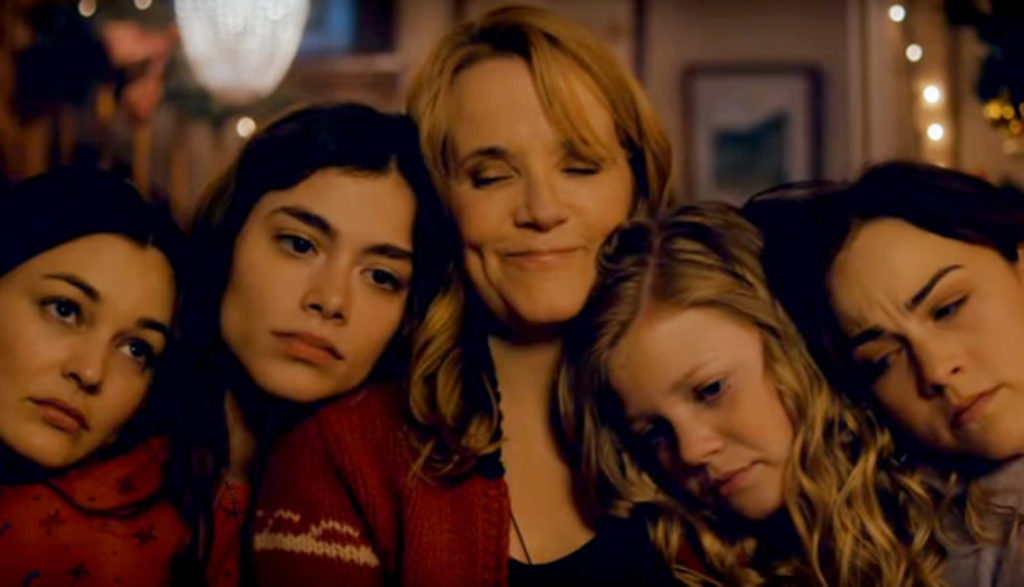
Sisters. Can’t live with ’em, can’t live without ’em.
If you’re lucky enough to have a sister, you know that it’s not always rainbows and cherries. It’s more like arguing over who stole the hairbrush and wondering why you have to share the same, small bedroom.
And whether they’re sisters from the 1860s, or from present day (as is the case in this modernized update of Louisa May Alcott’s cherished sibling story), all sisters share some hair-pulling moments.
Take, for example, the March family.
There’s Jo. Feisty. Opinionated. Strong-willed. And Jo has plans to become a writer and do “all the things.”
Then, there’s beautiful Meg, a girl with a kind soul who dreams of getting married and having children. Next, there’s Beth, sweet, selfless and perfectly content to just be surrounded by family. Finally, we have the baby of the family, Amy, a stunning artist who works hard to be included.
And even though they may occasionally fight and argue, the March sisters are always dedicated to sticking close through every disagreement, every hard moment and every year as they all gradually grow up together.
Even though the Marches are poor, they do not let their financial situation limit their creativity and joy. Marmee (the girls’ mother) homeschools her girls and teaches them important moral values, such as kindness, respect, selflessness and unconditional love. Though Marmee’s husband serves in the military far away, she runs her household with beauty and honor—always making sure that her children come first.
Forgiveness is one of the important values Marmee teaches her girls. She tells Jo that holding on to unforgivness and bitterness will actually hurt her. Marmee also tells Jo that outer beauty is not what matters. Instead, she says, “What’s most important is the workings of your mind.” In addition, each of the girls learns what it means to grow up and accept change.
Together, the March sisters create something they refer to as their “castle”: their attic. It’s decorated with all sorts of fun things. And it’s a space that metaphorically represents their hopes and dreams. The sisters work hard to value each other’s cherished longings (something that their mother has instilled in them), even though each girl’s dreams are different from her sisters’.
Jo, the story’s main character, is a brave and fierce young woman who champions women’s rights and desires to be a heroine herself. She often doubts herself, but she’s surrounded by a community that believes in her potential as an author. Additionally, she is steadfast and loyal and goes to great lengths (well, most of the time) to stand by her sisters, particularly Beth.
Meg is a kind peacemaker, while Amy represents a wistful example of treasured youth. Beth is the film’s purest character. She is graceful, sweet and genuine. She constantly puts others’ needs and wants before her own—even when she becomes ill. Beth shows each of the sisters what it means to love unconditionally and to be “good, sweet and strong.”
The girls’ father, Mr. March, eventually comes up with a system for his girls to help them resolve personal disagreements: He asks that they write down their “grievances” and then brainstorm a way to fix them.
Marmee and her daughters volunteer at the local shelter.
During the Christmas season, traditional carols are sung, some of which reference Jesus and the biblical story of His birth. Jo carries around (and reads) John Bunyan’s classic, The Pilgrim’s Progress. At one point, Jo wonders philosophically about what the point of living is when it always ends in death.
Young Jo speaks of an imaginary character who is a necromancer. She also says, “I will fulfill my cross.” The girls’ mother plays with them and asks each of them to “sacrifice one valuable to the altar, and she challenges them, “Be not selfish.” A sister is told she “looks like Voldemort.”
Jo reads a book titled, The Mythical Creatures Bible. Many of her imaginary scenarios and literary creations also revolve around the mythical world and various creatures there (including vampires).
Beth says she will see Jo “on the other side.”
Meg attends a party where she’s objectified and later kisses a guy who wants to take things further. She stops his advances, but only after he has grabbed her hips and acted forcefully toward her.
One of Jo’s fictional characters is referred to as “a cross-dressing pirate.” A few girls wear revealing outfits. Amy, the youngest sister, is called out for stuffing her bra with toilet paper. She wonders if she’ll ever be kissed or have a boyfriend.
Couples kiss, hold hands and embrace. Love is confessed a few times (though not always reciprocated), and some of the sisters struggle to express affection. Guys and girls are referred to as “hot” and “cute.” One of the sisters is told, “You look like a boy.”
The sisters act out a play and Jo mentions blood, the crushing of an individual’s bones and prying out “his innards with your teeth.”
The girls learn that Laurie, their cute male neighbor, had parents who died when he was young, leaving him to live with friends of the family. A young girl is thrown from a horse, hits her head on a rock and suffers an injury as blood covers her forehead and nose.
Jo struggles to master her anger, and she often throws things and breaks objects that stand in her way when she’s mad. One character dies.
Characters exclaim “good heavens,” “crap,” “what the heck,” “oh my god” and “freaking.” Name-calling includes “stupid,” “idiot.” “hag,” “brat” and “immature.”
Family members and teenagers at a various parties and gatherings consume beer, champagne, wine and hard liquor. An underage woman gets drunk and later vomits.
Jo is the most opinionated of the four March girls. At times, she’s controlling to a fault and often dismisses others’ ideas and dreams when they do not line up with her way of thinking. Jo also verbally lashes out when people challenge her or when she feels rejected. In one situation, she grabs a sharp object (ready to attack someone) after her personal journal is thrown into the fire.
Amy often acts aggressively when she is told she can’t hang out with her older sisters. At one point, she tells Jo, “I hate you.”
Meg wants to fit in so badly that she is willing to go to a high school party that makes her feel uncomfortable. She also hangs out with girls who aren’t genuine and pressure her to wear provocative clothing, drink and kiss guys that aren’t truly interested in her.
Jo exclaims that she’d rather “pass a kidney stone” than endure a particularly unwanted social situation. She later criticizes her sisters’ desire to get married, and she nearly refuses to attend a wedding. Jo believes marriage is a relic of the “1700s” and says it will ruin one’s life.
It’s tempting to think that the 1860s, when Louisa May Alcott first penned her beloved novel Little Women, were a simpler time. And, I suppose they were in some ways. (Obviously, they didn’t have Facebook or smartphones yet).
But it turns out that the struggles of young women growing up in that era actually translate quite well to 2018. We still face insecurity. Jealousy. Longing for love and purpose. Sisterly conflict. Those timeless issues of youth and family remain just as real today as they were in the late 19th century, as we see in this contemporary reboot of Little Women. Then and now, Alcott’s March sisters have personalities that could fill any room. They remain delightfully full of spunk, bravery and love.
This newest take on Little Women sweetly reminded me of my own three sisters and of all the fun times (and crazy moments) we shared growing up. The movie made me want to revisit my childhood and to relive those moments.
For a PG-13 flick, problem areas here are relatively minor. The biggest issues to navigate in this remake are some mild sexual innuendos and some drinking. Much more often, though, family issues take center stage as the March sisters move back and forth between deep conflict and deep affection.
In the end, the latest version of Little Women once again illustrates the importance of loving one another, of practicing forgiveness and of moving forward despite difficult times. And it teaches us to love our family and friends deeply, striving to help them reach their castles, “no matter where they may be.”

Kristin Smith joined the Plugged In team in 2017. Formerly a Spanish and English teacher, Kristin loves reading literature and eating authentic Mexican tacos. She and her husband, Eddy, love raising their children Judah and Selah. Kristin also has a deep affection for coffee, music, her dog (Cali) and cat (Aslan).